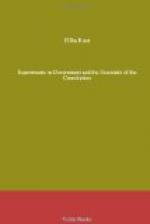“Certainly, all those who have framed written constitutions contemplate them as forming the fundamental and paramount law of the nation, and consequently, the theory of every such government must be, that an act of the legislature, repugnant to the constitution, is void. This theory is essentially attached to a written constitution, and is, consequently, to be considered by this court as one of the fundamental principles of our society.”
And of the same opinion was Montesquieu who gave the high authority of the Esprit des Lois to the declaration that
“There is no liberty if the power of judging be not separate from the legislative and executive powers; were it joined with the legislative the life and liberty of the subject would be exposed to arbitrary control.”
It is to be observed that the wit of man has not yet devised any better way of reaching a just conclusion as to whether a statute does or does not conflict with a constitutional limitation upon legislative power than the submission of the question to an independent and impartial court. The courts are not parties to the transactions upon which they pass. They are withdrawn by the conditions of their office from participation in business and political affairs out of which litigations arise. Their action is free from the chief dangers which threaten the undue extension of power, because, as Hamilton points out in The Federalist, they are the weakest branch of government: they neither hold the purse, as does the legislature, nor the sword, as does the executive. During all our history they have commanded and deserved the respect and confidence of the people. General acceptance of their conclusions has been the chief agency in preventing here the discord and strife which afflict so many lands, and in preserving peace and order and respect for law.
Indeed in the effort to emasculate representative government to which I have already referred, the people of the experimenting states have greatly increased their reliance upon the courts. Every new constitution with detailed orders to the legislature is a forcible assertion that the people will not trust legislatures to determine the extent of their own powers, but will trust the courts.
Two of the new proposals in government, which have been much discussed, directly relate to this system of constitutional limitations made effective through the judgment of the courts. One is the proposal for the Recall of Judges, and the other for the Popular Review of Decisions, sometimes spoken of as the Recall of Decisions.




